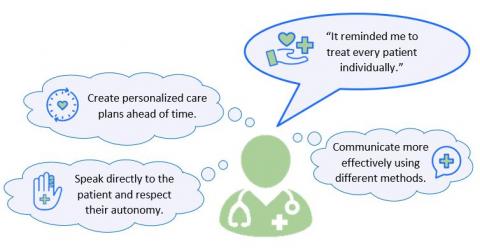Training for Healthcare Providers Improves Disability Competence
After taking Responsive Practice: Providing Health Care & Screenings to Individuals with Disabilities, healthcare providers' ideas about disability shifted away from a medical-model to a more social-model view of disability.
In the medical model, disability is seen as a problem to fix or cure. In the social model, the problem stems from an environment that is not fully inclusive or accessible to people with disabilities.

|
Ideas of disability before training:
|
Ideas of disability after training:
|
Many healthcare providers who took the training said they would change some of their care strategies. Trainees were better able to list specific ways that they could offer accessible, disability-competent care. Examples include creating personalized care plans ahead of time, speaking directly to the patient and respecting their autonomy, and communicating more effectively using different methods.

Due to many requests for more disability-competence training, a new module, Responsive Practice: Accessible & Adaptive Communication, is now available online, free, and on-demand at www.ResponsivePractice.org.
Professional development credits are available for both the original training and new module.
DOWNLOAD THE DATA BRIEF HERE.
Data source: project evaluation data.
This content is solely the responsibility of the NH Disability & Public Health Project and does not necessarily represent the views of the CDC or US DHHS.